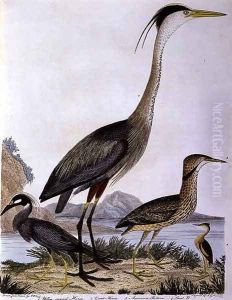Wilson, Alexander Paintings
Alexander Wilson was a Scottish-American poet, ornithologist, naturalist, and illustrator identified as the 'Father of American Ornithology'. He was born on July 6, 1766, in Paisley, Renfrewshire, Scotland. Wilson's initial livelihood was as a weaver, a trade he began as a young boy. However, his passion for poetry and nature would eventually define his professional life.
In his early life in Scotland, Wilson published poems that reflected the influence of the Scottish dialect and often addressed themes of injustice among the working class. His outspoken and politically charged writings sometimes brought him into trouble, and after a libel case, he chose to emigrate to the United States in 1794 in search of a fresh start.
Settling in Pennsylvania, Wilson initially worked as a schoolteacher. His interest in nature, particularly birds, grew during this period. He met the famous naturalist William Bartram, who encouraged Wilson's burgeoning interest in ornithology. Inspired by this interest, he undertook the monumental task of creating a comprehensive record of North America's birds, a project that would become his life's work.
Wilson traveled extensively across the United States, collecting specimens and making detailed illustrations of the birds he encountered. His masterwork, 'American Ornithology', was a pioneering effort in the field, and its publication began in 1808. The work was notable not only for its scientific importance but also for its artistic merit; Wilson's illustrations were both accurate and aesthetically pleasing. He managed to publish seven volumes of 'American Ornithology' before his death; two more volumes were published posthumously by his friend and supporter, George Ord.
Wilson's dedication to his work took a toll on his health. He died at the age of 47 on August 23, 1813, in Philadelphia, likely due to dysentery contracted during his travels. Wilson's contributions to ornithology were immense. He laid the groundwork for future ornithologists, including John James Audubon who would later follow in his footsteps. Wilson's systematic and scientific approach to the study of birds set new standards in the field, and his work continues to be respected by ornithologists and bird lovers today.
